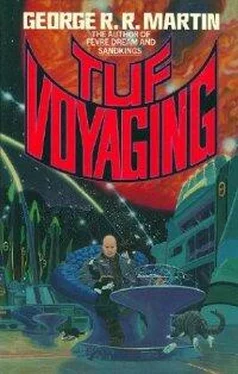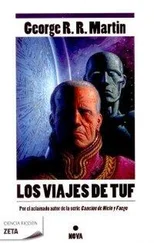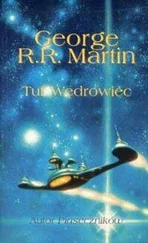“I would think the consequences obvious,” said Tuf. “S’uthlam is a threat to the allied worlds only because the S’uthlamese population is perpetually threatening to outstrip the S’uthlamese food supply. This renders S’uthlam, an otherwise peaceful and civilized world, inherently unstable. While the technocrats remained in power and kept the equation in an approximate balance, S’uthlam has been the most cooperative of neighbors, but this balancing, however virtuoso, must eventually fail, and with that failure inevitably the expansionists rise to power and the S’uthlamese become dangerous aggressors.”
“I’m no puling expansionist!” Tolly Mune said hotly.
“Such was not my implication,” said Tuf. “Neither are you First Councillor for life, despite your obvious qualifications. War is already at hand, albeit a defensive war. When you fall, should an expansionist replace you, the struggle will become a war of aggression. In circumstances such as those the S’uthlamese have created for themselves, war is as utterly certain as famine, and no single leader, however well-intentioned and competent, can possibly avoid it.”
“Exactly,” the boyish young woman from Henry’s World said in a precise voice. Her eyes had a shrewdness in them that belied her adolescent body. “And if war is inevitable, we had just as well fight it out now, and solve the problem once and for all.”
“The Azure Triune must agree,” came a whispered second.
“True,” said Tuf, “granting your premise that war must come inevitably.”
“You just told us the bloody expansionists would start a war inevitably, Tuffer,” Batch Norren complained.
Tuf soothed the black tomcat with a large white hand. “Incorrect, sir. My statements as to the inevitability of war and famine were predicated upon the collapse of the unstable balance between the S’uthlamese population and S’uthlamese food supplies. Should this tenuous equation be brought back into alignment, S’uthlam is no threat whatsoever to the other worlds in this sector. Under these conditions, war is both unnecessary and morally unconscionable, I would think.”
“And you avow this pestilential pop-weed of yours will be the thing to do the job?” the woman from Jazbo said contemptuously.
“Indeed,” said Tuf.
The ambassador from Skrymir shook his head. “No. A valid effort, Tuf, and I respect your dedication, but I think not. I speak for all the allies when I say that we cannot put our faith in yet another breakthrough. S’uthlam has had its greenings and flowerings and blossomings and ecological revolutions before. In the end, nothing changes. We must conclude this matter once and for all.”
“Far be it from me to interfere with your suicidal folly,” said Tuf. He scratched Dax behind an ear.
“Suicidal folly?” Batch Norren said. “What’s that mean?”
Tolly Mune had been listening to it all. She turned to face the allies. “That means you lose, Norren,” she said.
The envoys laughed—a polite chuckle from the Henry, a guffaw from the Jazbot, a booming thunder from the cyborg. “The arrogance of the S’uthlamese never ceases to amaze me,” said the man from Skrymir. “Don’t be misled by this temporary stalemate, First Councillor. We are six worlds united as one. Even with your new flotilla, we outnumber you and outgun you. We defeated you once before, you might recall. We’ll do it again.”
“You will not,” said Haviland Tuf.
As one, the envoys looked at him.
“In recent days I have taken the liberty of doing some small research. Certain facts have become obvious. Firstly, the last local war was fought centuries ago. S’uthlam suffered an undeniable defeat, yet the allies are still recovering from their victory. S’uthlam, however, with its greater population base and more voracious technology, has long since left all effects of that struggle behind. Meanwhile, S’uthlamese science has advanced as swiftly as manna, if I may be permitted a colorful metaphor, while the allied worlds owe what small advances they claim to knowledge and techniques imported from S’uthlam. Undeniably, the combined allied fleets are significantly more numerous than the S’uthlamese Planetary Defense Flotilla, yet most of the allied armada is functionally obsolete in the face of the sophisticated weaponry and technology embodied in the new S’uthlamese ships. Moreover, it is grossly inaccurate to say the allies outnumber S’uthlam in any real sense. You comprise six worlds against one, correct, but the combined population of Vandeen, Henry’s World, Jazbo, Roggandor, Skrymir, and the Azure Triune totals scarcely four billion—less than one-tenth the population of S’ uthlam alone.”
“One-tenth?” the Jazbot croaked. “That’s wrong. Isn’t it? It must be.”
“The Azure Triune has been given to understand that their numbers are barely six times our own.”
“Two-thirds of them are women and children,” the envoy from Skrymir was quick to point out.
“Our women fight,” Tolly Mune snapped.
“When they can find the time between litters,” commented Ratch Norren. “Tuf, they can’t have ten times our population. There are a lot of ’em, agreed, sure, but our best estimates—”
“Sir,” said Tuf, “your best estimates are in error. Contain your chagrin. The secret is well kept, and when one is counting such multitudes, one can easily misplace a billion here or a billion there. Nonetheless, the facts are as I have stated them. At the moment, a delicate martial balance holds sway—the allied ships are more numerous, the S’uthlamese flotilla more advanced and better armed. This is obviously impermanent, as the S’uthlamese technology enables them to produce war fleets far more swiftly than any of the allies. I would venture to guess that just such an effort is currently underway.” Tuf looked at Tolly Mune.
“No,” she said.
But Dax was looking at her, too. “Yes,” Tuf announced to the envoys. He raised a single finger. “Therefore, I propose you take advantage of this present rough equality to capitalize on the opportunity I am offering you to solve the problem posed by S’uthlam without resort to nuclear bombardment and similar unpleasantries. Extend this armistice for one standard year, and allow me to seed S’uthlam with manna. At the end of that time, if you feel that S’uthlam still constitutes a threat to your homeworlds, feel free to resume hostilities.”
“Neg, trader,” the cyborg from Roggandor said heavily. “You are impossibly naive. Give them a year, you say, and let you do your tricks. How many new fleets will they build in a year?”
“We’ll agree to a moratorium on new arms-building if your worlds will do the same,” Tolly Mune said.
“So you say. I suppose we should trust you?” Ratch Norren sneered. “To hell with that. You Suthies proved how trustworthy you were when you rearmed secretly, in express violation of the treaty. Talk about bad faith!”
“Oh, sure, you’d have preferred it if we were helpless when you came to occupy us. Puling hell, what a damned hyprocrite!” Tolly Mune responded in disgust.
“It’s too late for pacts,” declared the Jazbot.
“You said it yourself, Tuf,” the Skrymirian said. “The longer we delay, the worse our situation becomes. Therefore, we have no choice but an immediate all-out strike at S’uthlam itself. The odds will never get any better.”
Dax hissed at him.
Haviland Tuf blinked, and folded his hands neatly on his stomach. “Perhaps you would reconsider if I appealed to your love of peace, your horror of war and destruction, and your common humanity?”
Ratch Norren made a contemptuous noise. One by one, the other members of the delegation looked away, demurring.
Читать дальше












